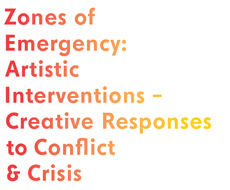Jack Persekian’s dismissal as director of the Sharjah Art Foundation following an exhibition that the government and community viewed was an attack on Islam and the community is another pointer to artistic expression under attack. In her blog post, Christine Donley reports, “The dismissal reportedly centers around a work by Algerian Artist Mustapha Benfodil. It has No Importance featured headless mannequins in soccer uniforms staged in a parody of a football match, that incorporated texts from stories, folk songs, jokes, urban legends, and graffiti culled from Algerian popular culture. Before the work was removed, it was on display in a courtyard, near an important mosque in an area known as the Sharjah Heritage District. Some of the text on the shirts and in the wall graffiti were sexually explicit and referenced Koranic texts reportedly used to justify rape during the Algerian civil-war that spanned most of the 1990′s.”
The withdrawal of the artwork from the exhibition shows the power that art has in challenging people to think about the realities in their environments. Most times when an artist pokes in the places society would rather remain quiet about, attempts are made to shut them down. In such situations, I believe then that the artist has achieved his or her goal as the conscience of the community in which he or she operates. The withdrawal of the Algerian art work and subsequent dismissal of Jack Persekian from his post speaks to the inability of society to acknowledge that it has a role to play in giving space to the untold stories.
These incidents are similar to events that have happened in Uganda, where artistic expression has been stifled on several occasions. In 2005, when women activists planned to act out Eve Ansler’s Vagina Monologues at the National Theatre in the capital Kampala, the Uganda Media Council shut down the play on the basis that, “The play promotes illegal, unnatural sexual acts, homosexuality and prostitution, it should be and is hereby banned”. Many dissenting voices without knowing what the play was about came out to attack the women activists as being an immoral influence on the fabric of Ugandan society.
Again in December 2010, the government through the Ministry of Ethics and Integrity barred the screening of a documentary on human rights defenders, which was purportedly said to promote homosexuality. The screening hosted by the Office of the High Commissioner for Human Rights and the Uganda Human Rights Commission was to take place at the National Theatre in Kampala.
These artistic expressions of the everyday life in different parts of the world are important for documentation and continuity of the stories that do not get into the mainstream media.

